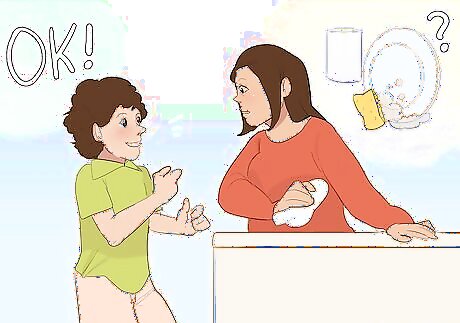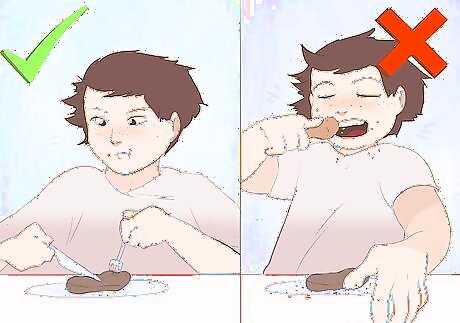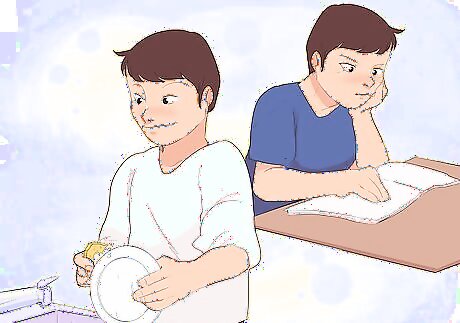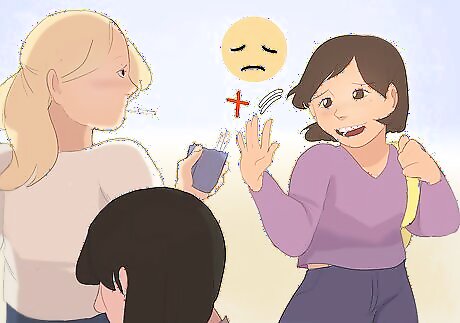
views
Acting Emotionally Mature

Don’t take your emotions out on others. To be mature, you’ll have to get a handle on the uncomfortable feelings you experience, such as anger, disappointment, or embarrassment. Cursing or shouting at others because you feel terrible won’t help you look mature. Find healthy ways to release and express your emotions instead. First, understand why you are feeling this way. Answer three questions: what happened before, how does it feel in your body, and how would you label the feeling? Next, decide how you can express this feeling without hurting yourself or others. You might write in a journal, burn off some steam by exercising or playing sports, or listen to some music that reflects your emotions.

Take ownership for your behavior. When you make a mistake, it won’t do you any good to blame someone else or make an excuse. Putting the fault off on others can ruin your relationships. Plus, you will never learn and grow if you don’t face consequences. Step up to the plate and take full responsibility when you make a mistake. Do this by immediately admitting your wrongdoing. This can be as simple as saying “My bad” or “That was my mistake.” If you hurt someone, apologize. Then, figure out how you can make amends. For instance, if you left the back door open and your cat got out, admit it. You might say, “I’m sorry. I left the back door open. I’ll go ask the neighbors if they have seen the cat.”

Think before acting. Maturity means thinking about the consequences of your actions. Whenever you are about to say or do something, take a couple of seconds to think about the outcome of your words or actions. Acting on impulse may feel good in the moment, but it can get you into trouble in the long run. To prevent impulse reactions, pause before making decisions or taking any action. Take a few deep breaths. Ask yourself, “what is my conscience saying? Will this harm me, or anyone else? How would I feel if someone did this to me, or how will I feel about myself later, if I do this?” For example, a friend asks if you want to cut class. You might pause and breathe deeply. Think about why you would do this—maybe you just want to hang out. Think about what might happen if you do it: you might get caught and get in trouble with the school and your parents. Going through this process each time you make a choice will help you make smarter decisions.

Practice gratitude. Adults are more likely to respect and admire you when you learn to appreciate the things you have. Limit complaining about what you don't have. Instead, practice gratitude. At the end of each day, jot down in a notebook three things that went well for you that day. Spend a few moments thinking about these positive events or outcomes. Try to draw in good feelings about them.
Behaving Appropriately

Follow the rules. If you want to act in a mature fashion, you need to respect authority. No matter where you go—home, school, or work—you will have to obey rules set by authority figures. In most cases, these rules are set to keep you and others safe, so comply with them. It’s normal for teens to want to push back against authority sometimes. If you want to discuss rules with authority figures, argue your case in a respectful manner. That way, the adult is more likely to listen. For example, you might say, “Mom and Dad, I’m fifteen now and I think I deserve a later curfew. I always come home on time and I never get into trouble. What do you say?”
Be a leader. One of the best ways to be more mature is to show responsibility in the different aspects of your life. Participate in class, have good study habits, and join an extracurricular activity. If you think you have enough time, try holding a leadership office in a club or picking up a part-time job.
Be responsible and own up to your actions. Follow through on your commitments and take care of yourself and your activities on your own as much as you can. If you do get in trouble for some reason, be honest and accept whatever consequences might follow. By holding yourself accountable for your own actions, you can show your maturity to your parents and others. For example, if your friends have invited you to a sleepover but you already agreed to babysit your younger siblings that night, politely turn your friends down. It might be hard, but being mature means sticking to your commitments and showing you can be trusted to follow through.

Use your manners. Having good manners shows respect. Proper behavior also helps adults see you as more mature. Good manners cover a wide range of behaviors: saying “yes, sir/ma’am,” answering the phone with “hello,” not interrupting others’ conversations, chewing with your mouth closed, and holding the door for the person walking behind you. Many rules of etiquette may already have been explained to you. However, you can ask your parents or other adults, “How can I show good manners?” to learn more.

Clean up after yourself. A mature person doesn’t expect others to go around cleaning up their messes. If you’re a teen trying to be mature, then you’ll want to start picking up behind yourself. This means putting your plate away after meals and wiping up any spills. You should also return games, movies, or books to their proper place after using them. Keep your room tidy by tossing dirty clothes in the laundry and putting away clean clothes in drawers or in the closet. Make your bed each morning immediately after you get up. Place your book bag on a hook behind the door to keep it off the floor. Line up shoes under your bed or on shelves in your closet so you and your parents don’t trip over them. Make it easier to tidy by setting a timer for 20 minutes and doing a deep-clean of your room once a day. Play some music to make the time go faster.

Develop smart and healthy habits. A mature teen knows to say “no” to delinquent behaviors. Using alcohol and drugs, lying, stealing, fighting, acting recklessly, or destroying others’ property will only get you into trouble or hurt. Instead, be drug-free, wear your seat belt when driving or riding in a car, and stay away from negative influences.
Developing Intellectual Maturity

Stay informed on current events. Read up on current issues and events in the newspaper and legitimate online sources. Don't rely on information from your social media feed. Make an effort to seek out other sources for news and stay in the know about what’s happening in the world around you. When you learn about current events, discuss them with your parents or other adults. You might say, “What do you think about the president’s new bill, Dad?” Look at online sources like CNN Student News, BBC News, and Smithsonian Tween Tribune. Read the newspaper in the mornings and check out a few academic journals from the library on topics you’re interested in.

Read books. Whether you are reading a book about real-world facts or made-up stories, reading can be a great hobby. Reading a book not only makes you wiser, but also adds new words to your vocabulary. This helps you improve your ability to comprehend and even enhances your own writing skills. Plus, reading can help you relieve stress, too. Go beyond the reading assignments needed for school. To enjoy the habit of reading, choose books that relate to your interests, such as airplanes or ancient Egypt.

Use your critical thinking skills. Critical thinking skills describe the way you go about solving a problem. You might jump at the quickest answer that comes to mind, or you might spend more time viewing all angles of the problem before selecting an answer. Being a critical thinker can help you better judge the consequences of your actions, evaluate the validity of information, and learn to think outside the box. A great way to build critical thinking skills is by playing board games. Schedule a game night with your family and/or closest pals. Good board game options include Apples to Apples and Scattergories.
Communicating in a Mature Way

Communicate clearly. Many adolescents and teens communicate in a style that leaves teachers and parents scratching their heads. If you want to be viewed as mature, you should speak in a way that others understand. Use proper words, not shorthand or acronyms. Write in complete sentences with proper spelling. If you want to learn appropriate ways to engage in conversation with others, ask your parents to role-play communication with you.

Use active listening. Many teens assume they know everything, so they don’t want to listen to others. A sign of maturity is knowing that you can learn something from everyone. Try to listen more than you speak. A good rule-of-thumb is to listen to understand rather than listening to reply. Try to figure out what the other person is trying to say. Don’t interrupt or rush to get your message across. Fully hear them out. Then, try to summarize what you think they said. For instance, your mom says, “I’ll be out of town this weekend and I’m concerned about leaving you at home alone. I think you should try to stay with the Woodards.” You might respond, “I can see you are worried about me being here by myself. I agree. I will see if Pat’s parents don’t mind me staying over.” EXPERT TIP Klare Heston, LCSW Klare Heston, LCSW Licensed Social Worker Klare Heston is a Licensed Independent Clinical Social Worker based in Cleveland, Ohio. With experience in academic counseling and clinical supervision, Klare received her Master of Social Work from the Virginia Commonwealth University in 1983. She also holds a 2-Year Post-Graduate Certificate from the Gestalt Institute of Cleveland, as well as certification in Family Therapy, Supervision, Mediation, and Trauma Recovery and Treatment (EMDR). Klare Heston, LCSW Klare Heston, LCSW Licensed Social Worker If you don’t understand what someone is trying to say, ask questions. Klare Heston, a Licensed Clinical Social Worker, suggests: “Practice listening to others. To ensure that you understand what they’re saying, try paraphrasing them and asking them questions.”

Avoid using slang or swear words. Using slang or other popular terms strictly in the presence of peers is okay. But, when you are communicating with adults, try to use words in their proper form. Don’t try to talk over adults heads by using terms they aren’t familiar with. Also, avoid using swear words, which is a sign of disrespect.


















Comments
0 comment